Sean Jacobs's Blog, page 180
April 29, 2020
Fear and solidarity
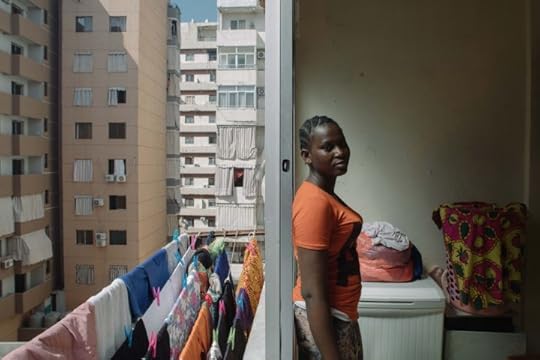
Sierra Leonean Domestic worker in Beirut, Lebanon. All images credit Aline Deschamps.
In a one-bedroom apartment in Beirut���s southern neighborhood of Kola, fifteen women from Sierra Leone are confined day and night. After losing their jobs, or escaping abusive households, their only source of food and shelter is the local Sierra Leonean charity which rents the apartment. Social distancing, imposed amidst the current lockdown, is a privilege they cannot afford. At night, in this 15 square meter room, they sleep all together on covers surrounded by suitcases. Some dream of returning home, while others wait for the lockdown���s end, hoping they will find work and send money to their families again.
Mariam, a 26-year-old Sierra Leonean living at the shelter, arrived in Lebanon in July 2019, with the highest hopes built on the heaviest lies. (Miriam���s name and other names have been changed in the piece to protect the women���s identities.) This mother of two from Nakin, in Sierra Leone���s Northern Province, used to be a teacher until she crossed paths with a local recruiting agency. It advised her to travel to Lebanon to become a domestic worker, promising she would double her salary and be able to support her family. It was an offer she could not refuse, though she could not afford the agent���s service fee. Mariam and her family decided to contract a loan in order to pay the $2000 fee, her ticket to a seemingly better future.
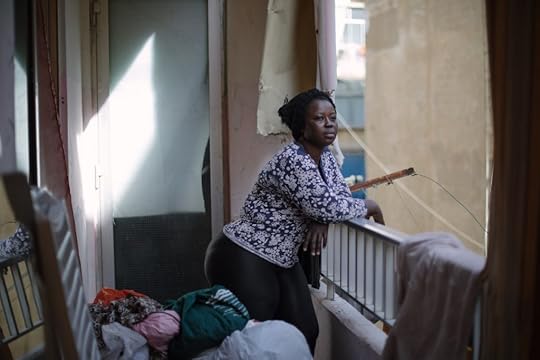 Sierra Leonean Domestic worker in Beirut, Lebanon.
Sierra Leonean Domestic worker in Beirut, Lebanon.Nine months after her arrival, amidst Lebanon���s most severe economic crisis in decades, Mariam had still not been paid by her employer. After complaining to her agency, she was locked-up in the bathroom for days, and beaten, or ���flogged��� as she says. She decided to run away to save her life. Mariam roamed the streets of Beirut with only $1 in her pocket, until she was brought to the shelter thanks to her friends from Sierra Leone. Fears of a COVID-19 epidemic were growing, doors were shutting and borders closing. ���This is not a nightmare, this is a deadmare,��� Mariam recalls saying to herself.
Mariam���s story is not uncommon. An estimated 250,000 domestic workers reside in Lebanon, coming from a host of African and Southeast Asian countries. They are subject to the kafala system, a sponsorship structure that legally binds foreign workers to their local employers and which, according to Amnesty International, “increases their risk of suffering labor exploitation, forced labor and trafficking, and leaves them with little prospect of obtaining redress.” Most domestic workers earned monthly wages equating to between $150 and $300 before the country was hit by an economic recession in October 2019, and then by the COVID-19 pandemic in March.
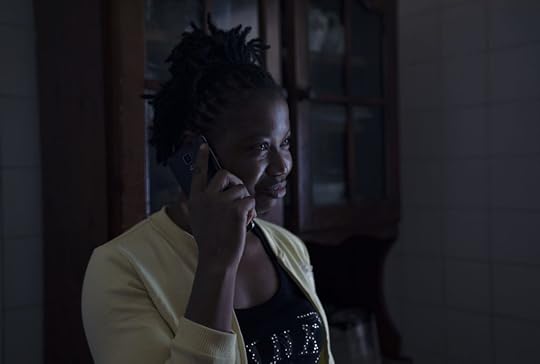 Sierra Leonean Domestic worker calling relatives, after her phone was confiscated for months.
Sierra Leonean Domestic worker calling relatives, after her phone was confiscated for months.On March 15, the Lebanese government announced a lockdown to prevent the COVID-19���s spread. Like elsewhere around the world, all non-essential businesses were shut and families summoned to stay home. For the country���s most vulnerable population, whose sources of income were already compromised by the ongoing economic crisis, this was another nail in the coffin.
For the women who found refuge at the Sierra Leone Committee���s shelter, things were even grimmer. Baylor Jalloh, vice president of the Committee, explains: ���During the economic crisis all the women here were working without getting paid,��� pushing some of them to escape their households. ���Now they are being thrown outside of [their] homes,��� he adds.
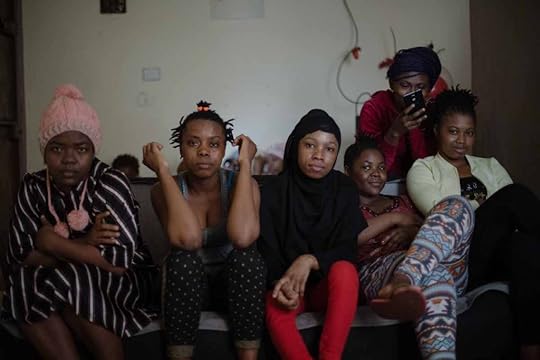 Domestic workers rescued by the Sierra Leone Committee. They see themselves as a sisterhood.
Domestic workers rescued by the Sierra Leone Committee. They see themselves as a sisterhood.Out of the 75 women currently hosted by the Sierra Leone Committee���s shelters, 20 have been laid off during the COVID-19 crisis. Now they have no other choice except to roam the streets in search of money and food, risking exposure.
The lockdown has also made it almost impossible for homeless domestic workers to find food assistance or refuge. Mosques and churches, which sometimes used to provide food, have shut their doors. Humanitarian organizations and local NGOs have had to put some programs on hold, and are now sounding the alarm. Madeleine Maxwell Hart, project coordinator from Amel Association International warns: ���shelters are in full capacity now.���
As of April 28, Lebanon has 717 confirmed COVID-19 cases and 24 deaths. Many of the women at the shelter refuse to go out. Fear is omnipresent among them, especially because they do not feel they can access healthcare. ���Of course we are so afraid of the virus, in Sierra Leone we already have one experience: corona is the sister of Ebola,��� says Mariam, remembering the epidemic which killed thousands in Sierra Leone between 2014 and 2015. ���We don���t have anything to protect ourselves against the corona. We just use our traditional medicine: the moringa leaves.���
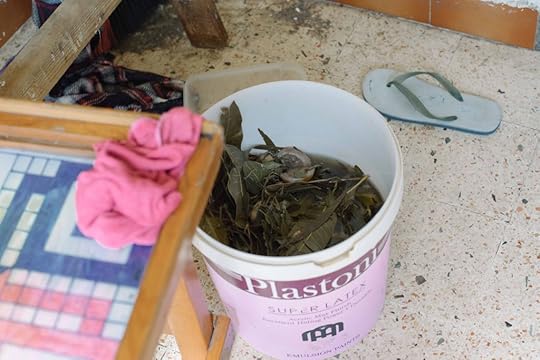 Moringa, used a medicine by the rescued women.
Moringa, used a medicine by the rescued women.Imane El Hayek, caseworker at the Lebanese NGO Migrant Community Center, explains why many might feel they cannot count on the healthcare system: ���Though domestic workers can get tested for free (���) many undocumented workers may be more reluctant to try to seek medical help or testing because they are scared they may be arrested on the way,��� she says.
Hart adds, ���As far as we know we have not heard of anyone without a residency being targeted when they went testing, but you do need a copy of your ID. And many domestic workers don���t have it because it has often been confiscated when they arrived in Lebanon. And they don���t have a copy in most cases. This is a big challenge.���
El Hayek stresses that ���migrants are also more vulnerable to the coronavirus in this situation, mostly because of their living conditions in more crowded places. They do not have the luxury to self-isolate. They do not have private transportation, so they are more likely to use public transport. (…) Most of them have limited access to clean water, gloves, masks, and anything that is recommended for self-protection.���
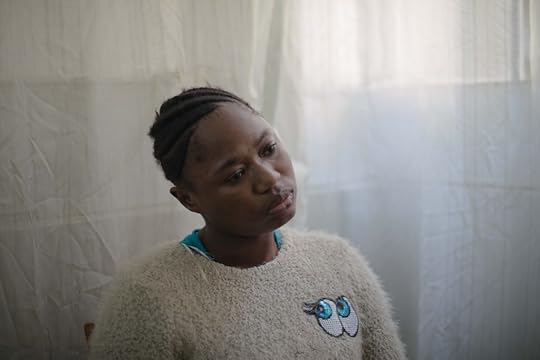 Domestic worker rescued by the Sierra Leone Committee in Lebanon.
Domestic worker rescued by the Sierra Leone Committee in Lebanon.When getting help from the outside becomes hopeless, some members of the community take matters into their own hands, in solidarity with those most in need. ���When I saw my sisters��� problems, I forgot about my own,��� says Jalloh, who also recently lost his job as a tailor. Over the last two months, his network and efforts have helped the committee save 20 women from homelessness and hunger.
Despite being essential for homeless and penniless migrants, such relief initiatives are hanging by a thread. Indeed, they rely on the goodwill of a few individuals who are also impacted by the lockdown. The committee���s president, Mousa Sasour, used to set aside a part of his salary for the committee. Today he has no income and struggles to find enough money to sustain the 75 women that the committee supports. Apart from contributions by its members, the Committee can only count on private donations.
When asked where her hopes reside, Tenneh, 23, responds: ���After God there is only the Committee. Besides that, there is nothing.���
Mariam and her flatmates have managed to gather some money to pay for an internet connection. ���We speak to our families everyday, this is the only thing that makes us happy here,��� they say.
Facing the situation with other women from Sierra Leone also helps. ���We do everything together, we cook together, we sleep together. Everything we do is in unity,��� declares Mariam as the women around her nod their heads in approval.
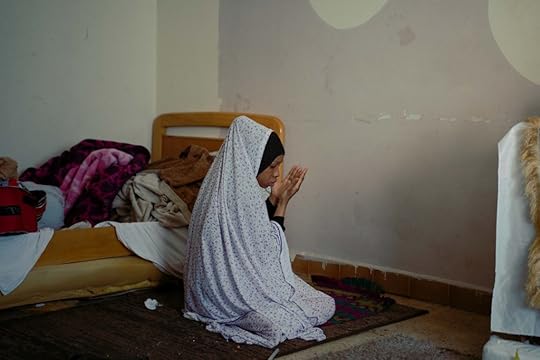 Prayers in the shared bedroom.
Prayers in the shared bedroom.For these women, all between 20 and 30 years old, the future looks grim. Sending remittances back home was the only reason for which they left their country. Now, some of the women���s parents are sending money for their daughters��� survival.
���They are selling their lands to pay for our bills,��� says Mariam in disbelief.
This situation is bound to become unsustainable as the COVID-19 pandemic spreads in Africa, forcing countries like Sierra Leone into lockdown. A few women already reported that their close ones have lost their jobs.
When asked about the future, the women sigh and raise their eyes to the sky. Will the sanitary and economic conditions allow them to find jobs again once the lockdown ends? If not, what will happen when neither community relief initiatives or families are able to provide food and shelter?
���If I did not have this Committee, I would have to prostitute. How else could I eat?��� fears Tenneh.
Some days, Tenneh and the women cook traditional food to comfort themselves and remember home. They even managed to find cassava leaf, a Sierra Leonean favorite from which they make a spicy sauce to eat with rice. And this leaves them with a glimpse of a smile on their faces.
Home is the space
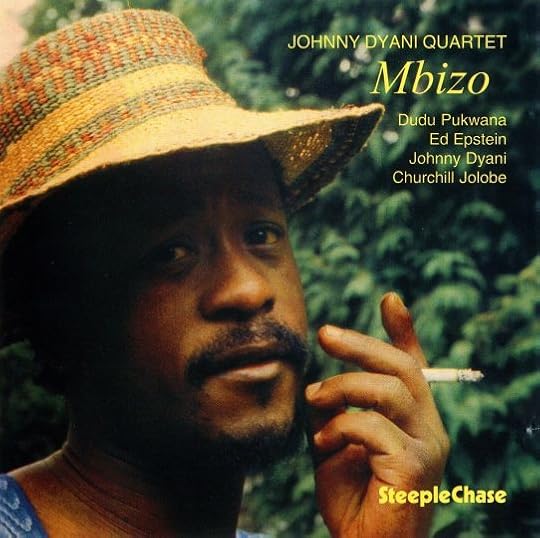
Album cover for SteepleChase.
��� Johnny Mbizo Dyani (from “Wish You Sunshine,” 1978)I wish you all sunshine
All of the time ���
I wiiish you all someday you will understand
The pain my people have suffered ���
Johnny Mbizo Dyani made this wailing call through song at the Willisau Jazz festival in 1978. “Wish You Sunshine” has made its way into many of his recordings and I am always left clutching for my life after every version of this song that I’ve been introduced to. It is not so much the suffering that sits with me but it is rather how his people in South Africa remained at the center of inquiry. In all of Dyani���s recordings, whether celebratory or melancholic, it is always clear to me that his music was firmly attached to the material, epistemic, ontological struggles and hopes of conquered blacks under apartheid South Africa. In “Lament for Crossroads,” “Song for the Workers,” and “Song For Biko,” the references to home were heavily embodied throughout his recordings.
Born in 1945, three years before the advent of apartheid, Dyani grew up in Duncan village in East London, where he started playing piano and later double bass. In 1964, he left on a one-way ticket for exile in Europe with members of the Blue Notes, which included Mongezi Feza, Nick Moyake, Louis Moholo, Chris McGregor, and Dudu Pukwana. The effects of being barred from home, and its unspeakable criminality, meant that Dyani and his peers were cast away, as it were, into involuntary fugitiveness and displacement.
Music gave them the space to express the distress of exile. Dyani���s music in particular, mined the unconscious and continually showed that nothing ever withers in the mind, both joy and suffering are pulled from hidden places. His homespun voice and beautiful melodies, lyrical bass tones, and tightly organized rhythm section were rooted in a tradition of chants and fluid improvisation; a different form of improvisation, not the sort which is stylistically borrowed from jazz, but rather a direct interaction with pre-colonial musical imaginations. Improvisation as a call and response���born out of the interaction of language, poetics, magic, and parables. Dyani played music with the energy and integrity of real experience. By doing so, he became a supreme figure within the improvised music scene and a formidable archivist of folk music from South Africa.
After the death of trumpeter and flautist, Mongezi Feza, the Blue Notes reunited and recorded an improvised requiem titled “Blue Notes For Mongezi.” Pianist Chris McGregor noted that ���Mbizo���s music grows like a tree with dignity������with deep, sprouting roots in Nguni musical aesthetics, yet never missing the co-creative potentialities through his collaborations with trumpeter Don Cherry, Turkish percussionist Okay Temiz and many others.
Dyani���s exiled status, proximity to Europe, and subsequent alienation from his people, fueled a particular contemplation, study and performance of music that was rooted in a historical consciousness that predated apartheid and colonial forms of ideology. His vast sonic vocabulary meant he could play unhinged, free from imposed genre logic across seas and borders without ever drowning or fatally compromising the sonic aesthetics that shaped his unique approach as a bassist. Put differently, Dyani���s brilliance relied on his emphatic insistence that western temporality had no definitive bearing on his music making. He could belt out folk stories through song while in full command of his double bass. He embodied a seductive tango with a nostalgia that only a body in one country and mind in another can understand. He showed us that behind the politics and apartheid scenery are human lives and people who had gone to great lengths to escape the banality of such a system���evading the danger of not being able to socially reproduce themselves on their own terms in their native home.
Dyani was one of those musicians who prompted me to contemplate about the sort of energy, space and institution that informed a type of music making, which I feel is closely aligned to Amilcar Cabral���s persisting and anchoring appeal for us to return to the source in the wake of political ���independence��� across Africa. His nostalgic ideation cannot simply be understood nor fully contained within jazz; therefore, he was one of the key music intellectuals who pushed me to think about what is outside of jazz. He points us towards folk music. Largely considering himself a folk musician, in many ways no different to, and drawing from the same cultural portal as native music makers in southern Africa.
He drew immensely from iingoma zasemaXhoseni (songs from the Xhosa people���s musical tradition). I am reminded of the documentary film A Brother With Perfect Timing, a film focused on Dyani���s close collaborator, pianist Abdullah Ibrahim. He remarked on how these instruments mimicked sounds that already existed on the continent, therefore, the proposal that Africans ���just picked up sounds from these foreign instruments��� could not be legitimately sustained. The large canon of South African jazz is emblematic enough to show that people���s exploration of western instruments is never detached from their own fertile soils. His aversion to being read as a jazz musician were clearly articulated: ���I don���t like to see my work described as jazz because it introduces connotations that I don���t regard as relevant.��� This is not so much a denouncement of the beautiful tradition of jazz, but rather a celebration of the hidden musical strands that shaped and anchored South African jazz and popular music.
Dyani argued that ���in Europe they admire the Americans so much but the Americans are copying us [South Africans]. It all comes from Africa, but the South African musicians are not strong enough within themselves.��� His insistence on relying on a folk musical canon came from this understanding, that home is the space and home is everything. He gave the double bass a voice like a folk instrument, mimicking his own singing tone always full of contemplation, rapture, and rage. His seminal record, Witchdoctor���s Son featuring Dudu Pukwana and John Tchicai is the most exemplary affirmation of the importance of home, its remembrance and heritage.
Years after Dyani���s passing, cultural workers in southern Africa, such as Thami Mnyele from the MEDU Art Ensemble, were debating the political imperative of the arts community and whether there can be artistic freedom from people in captivity. Mnyele and his interlocutors argued that art practice ought to sustain the class interest of the community, and the role of the artist is to ceaselessly search for the ways and means of achieving freedom. Mnyele understood the act of artistic expression as a productive force, a form of labor, and in his words, not different from the act of building a bridge���a collaborative process. For me, Dyani���s legacy lies between these provocations, the 1978 Willisau Jazz festival live recording, his most recent posthumously pressed record, is exemplary of this way of seeing the impossibility of captivity. In other words, captivity requires a relinquishing of subjectivity. Dyani was notorious for his positive instincts towards political subjectivity as an essential part of being. He was quoted saying: ���I���m trying to work for Africa so that Africa can work for me ��� Where the other cats are concerned the instruments are playing them, instead of them playing the instruments. I mean, I refuse to be played by an instrument.��� Dyani saw the alienating pressure of exile and argued that many exiled musicians succumbed to their instruments and got lost in the woods of European musical aesthetics. Working for Africa meant pursuing, with integrity, its musical heritage, community, and emancipatory politics.
Dyani���s live recording explicitly takes us on a process of longing and re-humanizing. He does this with artistic freedom and constraint, both by-products of his exiled status. He could honor both the laboring effects and revolutionary endeavors of the anti-apartheid struggle, while in search of an artistic presence that predated colonial conquest. Brazilian theorist and theater practitioner, Augusto Boal, said “you find yourself in the things that you do������in the process of doing we discover ourselves. This was no different for Dyani. By the time of his death in Berlin in 1986, Dyani had been playing at his prime, with deep contemplation and in constant search for the advancement of African polyphonic concepts. Having left South Africa at the height of urbanization and the cultural mixing and experimentation amongst the urban proletariat, he became one of the foremost musicians who continued the efforts of Marabi, a musical tradition that specifically came out of the laboring efforts of black urban life. At the age of 39, he left us with an un-lived future that has often felt like impossible knowledge. In the quiet violence of exile that buries its own, ruthlessly, the trajectory of his life is a testament that sometimes darkness does not pass, and you have got to dance in its drought infested garden until it pours.
April 28, 2020
Migration and Africa’s eternal lockdown
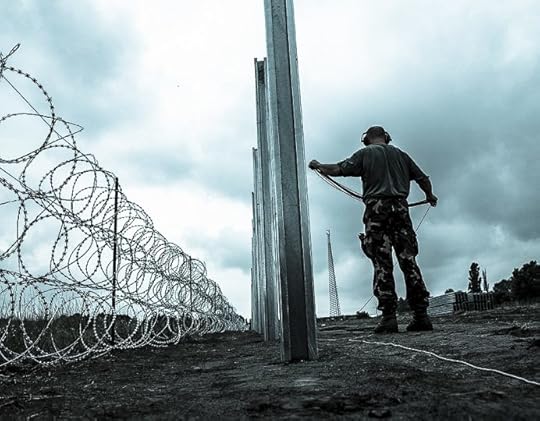
Hungarian Border. Image credit Freedom House via Flickr.
As for many people around the globe, the world has become much smaller for Europeans over the last months. From Norway to Italy, populations are in various forms of ���lockdown,��� principally confined to their homes for an as of yet indeterminable amount of time. Freedom of movement, a right many Europeans consider the EU���s greatest achievement, has suddenly become extraordinarily limited: not only is travel into Europe largely on hold, but many countries have even restricted domestic movement. This includes delimiting even the most mundane mobilities of work, exercise, leisure or socializing. No longer can people freely move through time and space as they wish. Now, they can only move in line with what is officially sanctioned as absolutely ���essential.��� When entering public space, everyone���s movement has become potentially illegitimate, threatening, and subject to punitive measures for transgression.
As their geographies painfully contract, many Europeans discover how maddening it is to be collectively confined. For many, this may be the first time they learn what it feels like to become subject to punishment for ���unauthorized��� movement; how draconian it is to be confined to their home, and how limiting it is to have the terms of what is and is not ���essential��� in life determined for them.
To be sure, the current shock to global and European freedom is extreme. Yet, the unprecedented distress of these momentarily locked-down lives should prompt Europeans to realize how much their leadership, with their consent, continues to curtail the freedom of movement on a permanent basis in Africa. In fact, Europe���s ill-conceived ���management��� of African migration���a euphemism for containment and carried out in profitable collaborations with partners across both continents���increasingly confines Africans to a form of continental lockdown.
Many of the same European leaders who recoiled at the thought of closing internal borders to halt the pandemic are the ones that progressively undermine vital patterns of regional mobility and integration in Africa, foster exclusionary and territorialized forms of African citizenship, and deliberately endanger the lives and dignity of Africans on the move. Using barbed wire, bogus rescues and an often blatantly patronizing ���concern��� for the well-being of poor Africans, Europe stipulates that most Africans must stay in their own countries and make do with what they have. With active or passive endorsement by the EU or individual member states, those who move ���irregularly��� often end up trapped in exasperating limbo and suffering in detention centers, refugee camps, or rescue boats without permission to disembark.
As they are locked down to halt a pandemic, Europeans now too get a sense of what it feels like to have a multitude of different kinds of movements crudely re-categorized into legitimate and illegitimate forms. Momentarily deprived of the right to move freely, they grasp, perhaps more viscerally than ever before, the full meaning of freedom of movement. Accordingly, many insist they can only endure this for the time being and keep a close eye on any potential attempts to finagle present-day measures into a new, post-pandemic permanence. As German chancellor Angela Merkel stated, the restrictions during this crisis, indispensable as they may be right now, are ���dramatic��� and must be strictly ���temporary.��� With many governments edging towards easing restrictions, Europeans breathe a sigh of relief. Although new lockdowns may become necessary until there is a cure and a vaccine, they have always known that they won���t be confined like this forever. Moreover, many Europeans agree in principle that current measures are necessary for everyone���s protection.
Africans however, locked down indefinitely on their own continent, are not so lucky. Unlike social distancing in the times of COVID-19, claims that preventing Africans from leaving their homes promotes their or their countries��� safety and security remain spectacularly unsubstantiated. In fact, it serves neither their nor Europe���s ���protection,��� but in many ways the exact opposite. The risks and punishments of ���illegitimate��� movement are infinitely higher for Africans too.
As Europeans currently experience these short-lived restrictions on movement, it is an exceptional time to reflect on what Africans endure permanently in all of Europe���s name and the significance of freedom of movement to everyone in the world.
The peace theater
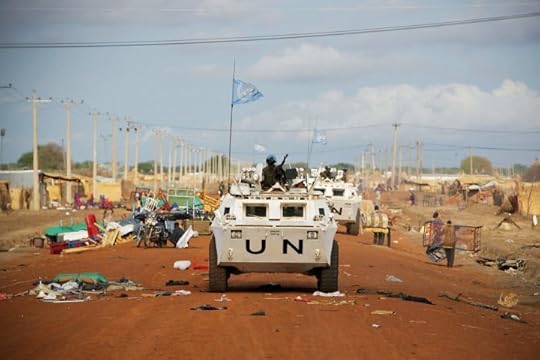
Abyei, Sudan. Image credit Stuart Price for UN Photo via Flickr CC.
Fanfare around United States Representative Ilhan Omar���s (from Minnesota���s Fifth District) introduction to the House Committee on Appropriations of House Resolution 5948, ���the Global Peacebuilding Act of 2020,��� in February this year, is illustrative of the fecklessness and irresponsibility of the Republican Party and, more importantly, how low the bar has been set in US politics with regard to addressing global problems. The bill proposes shifting funds from the budget of Overseas Contingency Operations (OCO) controlled by the Defense Department to the State Department to pursue peacebuilding. However, tragically, this is half palliative theater, half misbegotten imperialism.
First, closer inspection of OCO funding for the past couple of years shows that this money is regularly designated by Congress to fund the State Department���s work in areas such as famine relief, refugee assistance, and aid to Africa and the Middle East, but President Trump has steered these monies into what are essentially military operations for Afghanistan, Iraq, and Syria. Rather than a special bill to symbolically move monies around, there should be more focus on the bigger issue of the division of power between Congress and the Presidency over who determines how much money is spent on what. Since 2012, when OCO funds were first established, President Obama requested they be used by the State Department and USAID. By contrast, starting in 2016, Trump redirected these funds back into Defense Department coffers. Instead of pleading to shift some money back where it was intended, a bill condemning the defunding of the State Department and the dereliction of Congress and the President in allowing this is crucial.
Second, although progressives need to prompt a debate on spending priorities and any redirection of money out of the bloated US defense budget is a good idea in principle, the chances of this bill becoming law���along with the six others comprising Omar���s ���Pathways to Peace��� legislative package to fundamentally alter US foreign policy���are less than zero. To do so it would have to get through committee, win a majority in the House, win a majority in the Senate, and not be vetoed by the President. At a time when Democrats are looking for an edge to defeat the Trumpublicans and must parry charges that they are somehow soft on military spending, it���s not likely there will be much political will to pick this particular fight now. Exerting political capital on a minor repair of budgetary legislation is a missed opportunity to present how investing in non-coercive components of foreign policy are essential to US national interests.
Third, while ���peacebuilding��� has become fashionable, it is frequently a fiction. The problem is rooted in the idea that external actors are instrumental in bringing peace, but it is also usually fraught with a liberal agenda that contends democracy and capitalism are panaceas. However, even the UN and the African Union (AU) which have the most experience and most success in peacebuilding do not have a strong record. While the aim is ���peace,��� in reality this has meant transforming these societies in our own image and impose a Westphalian state. Most peacebuilding begins with building the capacity of the state���to collect taxes, to provide services, to ensure security. But this is exactly what weak governing authorities with authoritarian aims need to achieve their goal of control. It also makes this autocrat dependent on the external power. This type of peacebuilding creates repression and dependency. Peacebuilding should be about empowering those experiencing crisis to find their own solutions, otherwise it���s basically mending the fabric of empire.
In short, the drama and the optics of demanding more resources for ���peacebuilding��� may galvanize some of the Democrat base, but it does nothing to structurally address the crisis in American democracy, the battle for voters in the 2020 election, or the dangers of an arrogant culture that calls intervention ���peace.���
April 27, 2020
COVID-19 deepens division in the Comoros Islands
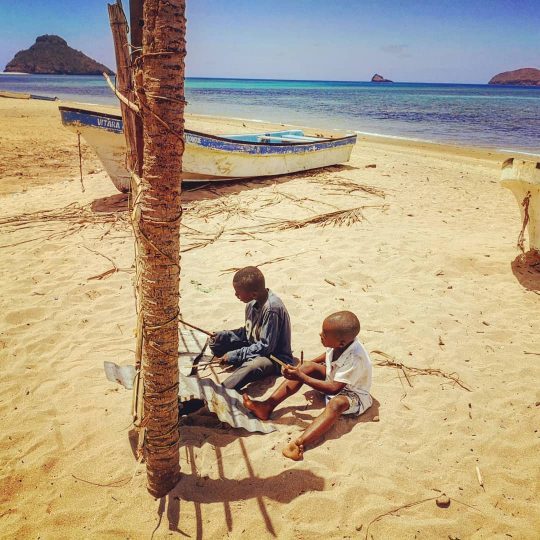
Image credit James Caunt.
I find Omar in a small cafe in the bustling medina of Mutsamudu, where he has ordered us some special Comorian tea and a jug of freshly-squeezed guava juice. I had heard mysterious tales of clandestine boats leaving the shores at night here on Anjouan���one of the four Comoros islands located off the coast of East Africa, midway between Madagascar and Mozambique���and I was curious to find out more. After some tentative inquiries, I was given Omar’s number. He is one of the countless thousands who have made this dangerous journey before, and someone whom I had wrongly referred to as a ���refugee.��� ���We are not refugees,��� he retorts fiercely. ���They on Moare (Mayotte) are our people.���
The situation between these tropical islands is complex. Three of them���Grand Comore, Moheli and Anjouan���gained independence from France in 1975 to become the fledgling country of Comoros, now known as The Union of the Comoros. The fourth island, Mayotte, has repeatedly refused to join its brother islands in their short, conflict-ridden history as a nation, choosing instead to remain under French control despite the Comoros government���s insistence (with the support of the UN) that Mayotte was illegally annexed. There are still four stars on the Union of the Comoros flag, and that is unlikely to change anytime soon.
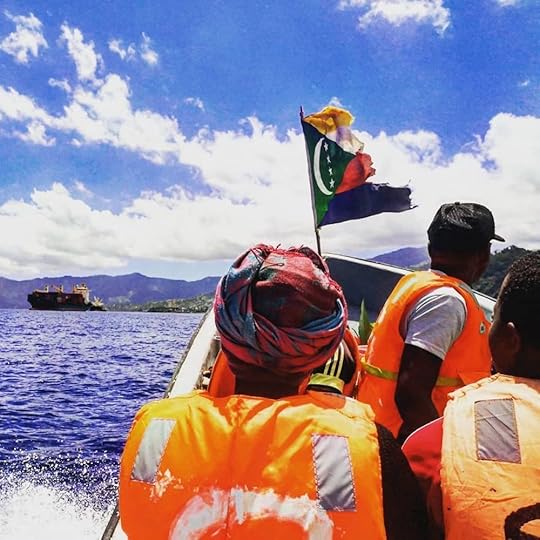 Image credit James Caunt.
Image credit James Caunt.While the Union of the Comoros has endured political instability, corruption, inter-island conflict and more than 20 coups or attempted coups, Mayotte has flourished in comparison���a tempting island of stability and prosperity, just a short boat ride away. An uneasy co-existence between the independent islands and the stubbornly French outpost took a turn for the worse back in 1995, when the French government decided to put an end to visa-free travel from the other islands. This decision separated families and made legal passage to Mayotte all but impossible for the majority of Comorians, leading to a surge in illegal migration���mostly in those clandestine boats from Anjouan.
Over the years the dispute has continued to intensify, leading to a complete suspension of visas in 2018 while the ���white bulls������as the boat traffickers from Anjouan like to call themselves��� played their deadly game of cat and mouse with the French Coastguard, night after night, year after year. It is estimated that up to 10,000 Comorians have lost their lives on the crossing since 1995, with local observers citing far higher numbers.
Under this backdrop, residents of Mayotte have repeatedly voted for even closer ties to France, officially becoming the 101st French department in 2011 and creating a new EU frontier 10,000km away from Paris. This official integration and the benefits that it brings���funding for hospitals and schools, minimum wages, unemployment benefits and so on���has left the 270,000 residents of Mayotte with a standard of living over 50 times higher than that of the other three Comoros Islands.
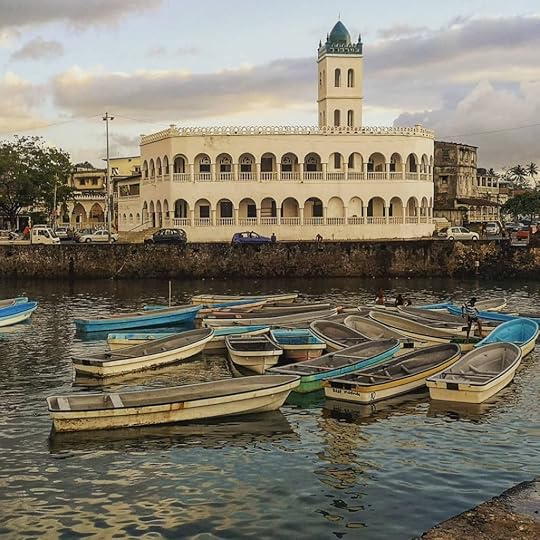 Image credit James Caunt.
Image credit James Caunt.Thus, the lure of Mayotte is incredibly strong, particularly for those on Anjouan, from where the bright lights of Mayotte are visible on a clear night. But despite the risks that people take to get there��� financial, legal and physical dangers lurk in the rough channel between the islands��� disappointment and difficulties often await.
���Mayotte is about getting a better life, having a job, easy access to the hospital,��� Omar explains. ���Mayotte is an El Dorado for many of us, but all of this is not true if you���re a clandestine person. You can’t get a proper job without papers, and you are always worried that the police are going to catch you and send you back.���
This is exactly what happened to Omar. He took the journey in 2014, making it successfully across the channel after spending his life savings to secure passage. However, he failed to find a job or a place to stay and was arrested and sent back after just 12 days.
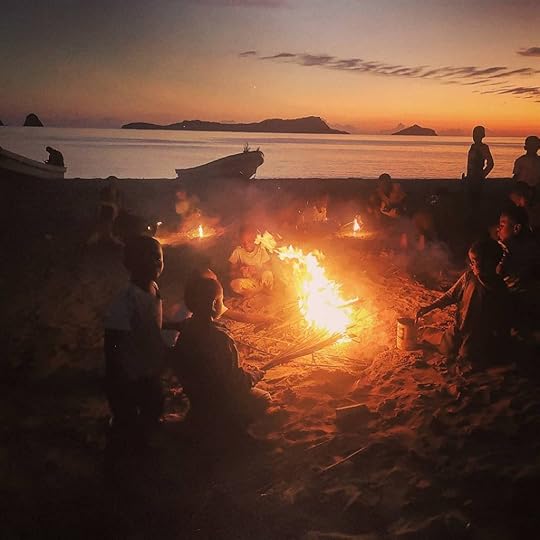 Image credit James Caunt.
Image credit James Caunt.���When you are clandestine in Mayotte and you do find a job somewhere, most of the time it’s working in houses for people; mainly construction, gardening, things like this,��� he continues. ���But those employers often don’t pay you, and they threaten to call the migration police if you complain.���
This grim reality isn���t enough to deter people from attempting the perilous crossing, however, usually onboard expensive, rickety, and overcrowded boats known as kwassa kwassa. Omar says that every family in Anjouan has a kwassa kwassa story to tell, and it is usually a sad one. ���The sea is a cemetery,��� he says. ���Thousands and thousands of people have died trying to get to Mayotte, and most of the people that do make it across are usually sent back here in a few weeks.���
However, the arrival of COVID-19 in Mayotte has seen a bizarre reversal of the kwassa kwassa migration route. ���The kwassa kwassa have changed direction,��� Omar wrote to me in a recent update on the situation. ���The world has truly gone mad.���
With the virus rapidly spreading on the French island, the Comoros Navy is now patrolling the coast of Anjouan, intercepting boats of people fleeing in the opposite direction. ���The Comorian coast guards, whom France has been asking in vain for years to fight against the departure of kwassa kwassa towards Mayotte, are now mobilized against arrivals from Mayotte,��� reports Le Journal De Mayotte, with exasperated irony. ���Suddenly, Mayotte has become French in the eyes of those who previously denounced it as an annexation.���
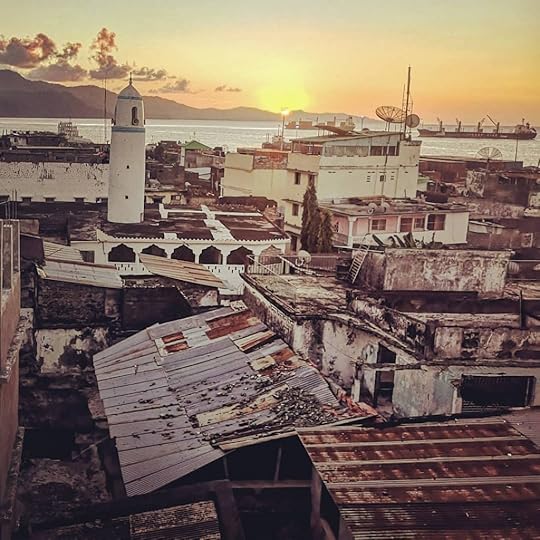 Image credit James Caunt.
Image credit James Caunt.At the time of writing, Comoros has no recorded cases of COVID-19, but with kwassa kwassa now coming back clandestinely from Mayotte (it is difficult to be precise on the number, but with some boats intercepted, it is safe to assume that at least a few have passed through already), it seems only a matter of time. ���Passengers disappear into the wild,��� the newspaper continues. ���Ironically, like when they arrive in Mayotte, the kwassa kwassa unload their passengers and leave without being seen.���
It is yet another dark chapter of the kwassa kwassa, tragic symbols of death and dashed hopes which continue to haunt Comorians. With a vulnerable population, high levels of poverty and no real healthcare system to speak of, Anjouan and the rest of the Union of the Comoros face an uphill battle to keep the cursed boats from returning to their shores with an unwanted passenger���the dreaded virus.
The whole chaotic, divisive and fraught situation sums up the recent history of the Comoros Islands, a glorious volcanic archipelago rich in history and diverse culture that is still suffering from the complex aftermath of colonialism. Each island is unique in many ways and the idea of an overall Comorian identity is struggling to take root, with the exceptional case of Mayotte muddying the waters further still.
���The Union of the Comoros has missed yet another opportunity to assert the greatness of a nation,��� Le Journal De Mayotte concludes. ���First, by failing to express its solidarity with the Comorian brothers in Mayotte affected by the epidemic, then by neglecting to negotiate coordinated means of transport for those who wanted to return to their island of origin.���
Mama Africa
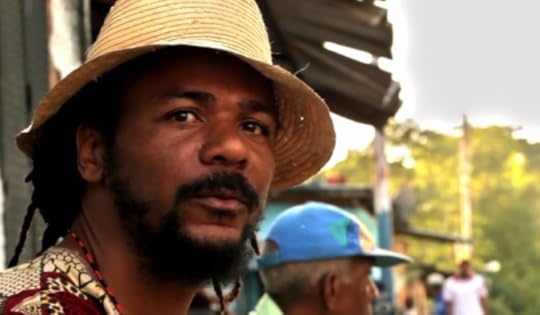
Still from Mama Africa.
For Afro Venezuelans, Africa is a sacred land that embodies and represents histories and spiritualities they lost when they were forced to other destinations and times. Their imagined connection with the continent is a repertoire of cultural practices and beliefs that live in tension with the Catholicism that many of them embrace. Mama Africa grapples with the community���s longing to re-connect with Africa. Directed and produced by the Afro Venezuelan filmmaker Benito Marquez, the documentary focuses on Yoruba religious practices and their resonance with the spiritual life of Afro Venezuelans.
Afro Venezuelans incorporate Oludumare, who according to Yoruba religion, is the creator of everything in the universe, into their spiritual life. One poignant example of Oludumare���s manifestation involves a form of divination known as Ifa. Ifa is not only a source of knowledge and spiritual practice, but also a notion that captures times and spaces beyond western imperialism (experienced in the transatlantic slave trade as well as colonialism). Ifa becomes a hope for re-rooting the African de-rooted through slavery, colonialism and neocolonialism, because, as the Nigerian Professor Owo Baba Onigbinde says, ���Ifa is where [they] are created.���
Another critical source of connecting spirits with the living and Africa with its diaspora are Yoruba practices of music, drumming, and dance. This is reiterated by Solagbade Popoola, the Nigeria- based Yoruba religious leader. What goes on in the diaspora, according to Popoola, ���is just an extension of what we do here ��� it means that connection between the diaspora and motherland has never been cut. We may not see it physically but it was never cut ��� but it is always there ��� it is only for us to explore it.��� One useful way of exploring this connection is music. For Popoola, music is a central medium of communication among people as well as between spirits and people. He says music ���brings all of us together all the time ��� I have listened to most Cuban music and Brazilian music; they are actually Yoruba music.��� Echoing this, another Yoruba man Olorum Nimbe Popoola stresses, ���distance might have taken us away from each other. There is one thing you should always know. Blood is thicker than any other thing ��� we might be apart in terms of distance, but we are always together ��� the blood ties [sic] is always there.��� This sentiment is accompanied by an open invitation for the diaspora ���to trace their origin back to Africa: be it Nigeria, Ghana, Kenya ��� anywhere. It is what they need to do because this is where their origin is,��� as Ifagbenusola Popoola insists.
Mama Africa interweaves the personal and the political by zeroing in on the recollections of individuals and linking them to broader issues. As a result, viewers get to appreciate how race, colonialism, capitalism, and the struggle for freedom and inclusion infuse Afro-Venezuelan spiritual practices and community understanding of those practices. Participants in the documentary share their frustrations and grievances about how colonialism and neocolonialism dispossessed Africa of its social, economic, political, spiritual, historical, and epistemic wealth. This is most visible in the Nigerian activist Oludayo Adeyinka Adetayo���s statement where he reflects on western domination and resource exploitation. For Adetayo:
The problem with Africa is white supremacy ��� you see, Africa has the richest soil, the richest raw materials, the richest anything you may think. We have copper, iron, zinc, petrol, gas ��� but the problem we have in Africa generally is white supremacy. America, England ��� IMF, the United Nations put so much pressure on Africa. They are taking Africa out of existence ��� capitalism is like a poison. It is eating us. Capitalism is about greed, selfishness, oppression. Capitalism is an evil way of making some people richer and some people poorer. That is why the Western world will always suppress [���] people fighting for the masses.
Similarly, the search for one���s roots is seen as a collective struggle central to reinforcing cultural political, legal, and economic claims by African diasporas. For instance, Afro Venezuelan activist Lendis Solarte critiques the lip service of identity celebrations like the ���day of Afro descendant Afro Venzuelans.��� He also acknowledges that under the presidency of Hugo Chaves Frias ���we were made visible ��� there is a law against racial discrimination ��� that is an extremely important step ��� we are already inserted within the laws of our country.��� But for Lendis, the struggle should not end there. He says:
Because we have some representatives in the political part, or because we have about two governors, or maybe three mayors who may be Afros or blacks, or because we have two or three ambassadors who can be black, I consider that the work does not end there. I consider that the work is for example in doing what is being done. That young people do not have the need to travel to the big cities to professionalize, also that new opportunities be opened ���
As much as this documentary places the Afro Venezuelan desire to re-connect to Africa within broader historical and contemporary struggles against global and historical inequalities, it practices its own curious form of marginalization, in that almost all of the voices are male. Women are mentioned mostly in passing or when they appear they say only a few words. For example, we hear about women when Lendis Solarte speaks about his relatives. The first woman, Jacksnellys Cleofe Rojas, appears at the twenty-second minute mark to pray for her family and the Afro descendant community as well as briefly explain her work on drums and drumming. One wonders how this narrative of connections lost and re-forged would have sounded if the women also spoke.
April 26, 2020
On being queer and contained
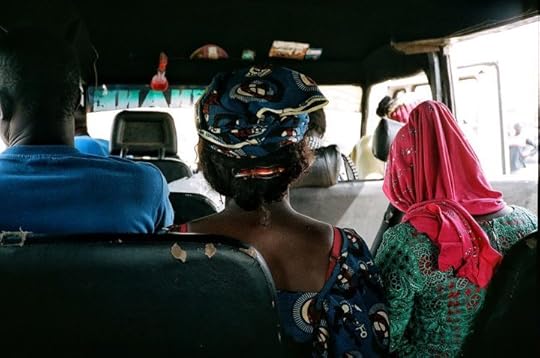
Joal, Senegal, 2018. Image credit Cristian Leonardo via Flickr CC.
On March 31, I received the following WhatsApp message (in a mix of Wolof and French, which I have translated directly for readability) from Selly, a young woman in Senegal. (Selly and the names of others in the piece have been changed to protect their anonymity.)
I���m sorry but I wanted to tell you something. I don���t know how to put it, but ��� it���s just that they have found a husband for me, and they are telling me that I have to get married. They announced it to me yesterday. I don���t know what to do [���] I���m madly in pain.
���They��� refers to Selly���s maternal family in Casamance, in the south of Senegal, where she had returned two weeks earlier. Selly had moved to the Gambia last fall, to play in the Gambian national football competition for the 2020 tournament. But the competition was now cancelled, and without having much else to do in the Gambia but play football, and with the borders between the two countries closing, it was better to go home. Or so she thought.
COVID-19 is hitting societies all over the world. Beyond the obvious threat to public health, it poses economic and social challenges, particularly in countries where the majority of the population depends on daily earnings for survival. The Nigerian writer, OluTimehin Adegbeye, convincingly argued that social distancing cannot work in Lagos, Nigeria. A similar analysis has been made for Nairobi, Kenya, where hundreds of thousands of citizens live in cramped informal settlements. (The virus itself is not the only threat to Kenyan lives: on April 16, The Washington Post reported that 12 people have died so far from police brutality exerted on those who did not respect the curfew. The COVID-19 death toll in Kenya currently stands at 14.) The Senegalese researcher Dr. Massamba Gueye warns of another danger of COVID-19, which is that ���it attacks the social foundation of our communities.��� In Senegal, this social foundation rests for an important part on large-scale religious gatherings and ceremonies that mark important life stages: birth and baptisms, initiation, marriage, and death. Such ceremonies have all been suspended until further notice.
But COVID-19 does not only threaten the social fabric of society. It can also fuel the opposite���a tightening of control over people���s behavior, in order to perpetuate a conservative social order. Now that many people find themselves more or less locked at home with their families, with inter-urban transport halted and a curfew in place from 8 p.m. to 6 a.m, families have more direct power over their children, especially adult children, than before. In an attempt to preserve the normal order of things, Selly���s family is exerting pressure on her to get married. The current pressure is not solely COVID-19-induced; it is an unfortunate coincidence in timing. Selly is 21 years old, which in the eyes of her maternal family means it is high time that she marries. (Her female cousins who are around the same age have all married, and some of them have given birth to children.) Selly does not want to marry a man however, and she does not display any interest in what is deemed appropriate behavior or dress for women in Senegal. Her family is not just finding out about these things. On the contrary, during the time she played on a local women���s football team, whenever she had a fellow female football player visit her at home, her cousins would make fun of them and call them lesbians.
If we understand queerness to comprise the fluidity and instability of our social lives, as Stella Nyanzi argues in the article “Queering Queer Africa,” then the COVID-19 induced containment is perhaps its antithesis. If COVID-19 were not there and the problem of marriage had presented itself to Selly (which it inevitably would have at some point), she would have had more options. She had already called her older sister for advice when her family told her it was time to marry; her sister, who lives in Dakar with her husband, knows about Selly���s queer life, and expressed her support for Selly. In another situation, she could have gone to Dakar to stay with her sister; moving in with siblings, friends, aunts or uncles is very common in Senegal. Selly could have also argued to her family that she needed to go to Dakar because her football career demanded it, or because she wanted to pursue her studies or look for work, and therefore might have been able to negotiate the postponement of marriage. Now she has few options.
There is a disconcerting resemblance between how Senegalese talk about homosexuality and how they discuss COVID-19. For one, in an attempt to explain the sudden emergence of this puzzling and unpredictable virus, there have been people who have suggested that the virus is a punishment from God for the morally reprehensible behavior of people, and of queer people in particular. This idea seems to have gotten a foothold in some popular perceptions of the pandemic; my queer friends in Senegal confirmed that this idea is currently circulating.
Fatou, a 29-year-old woman living in Dakar, said that she had watched videos in which kilifa (leaders) of Muslim brotherhoods suggested that people���s bad behavior are the cause of the virus. Homosexuals (as a catch-all for gender and sexual dissidents) are the central figures in the image of the morally reprehensible subject in Senegal. Nafissatou, a Dakar-based human rights activist, added: ���everyone is saying this now, either plainly or in a nuanced way. I���m awaiting Mame Makhtar Gueye, I���m sure he will play his part.������
Gueye is vice-president of the Islamic NGO Jamra, and her most ardent antagonist. He has given numerous television interviews in which he denounces Nafissatou as Senegal���s ���biggest lesbian��� who ���contaminates��� today���s female youth to ���all turn into lesbians.��� He will most likely attribute the cause of the virus spreading, in part, to the queer population. While being called out as a cause of the virus, Nafissatou works to address the outbreak���s consequences. When we were on the phone one recent evening, I heard a lot of background noise. I thought it was her television, but it was the chatter of a group of queer men in her living room. These men, who���ve lost their meagre income as a result of the crisis, and lack a safe family environment to return to, now sleep in her living room.
Selly cannot make use of the safe space that Nafissatou provides. Being stuck at home for the duration of the crisis, she is confronted with her family���s stigmatization of her behavior. Less than two weeks after I received her first message about the marriage proposal, the pressure has mounted. The neighborhood imam, an important and respected figure in the community who regularly mediates in family issues, had been asked to interfere in the matter. On April 10, he asked Selly to come see him that day after the afternoon prayer. He spoke to her about the need to accept her so-called destiny as a woman, which is to marry a man and to have children. He also asked her to stop playing football, and to start dressing and behaving herself ���as a woman���. Unsurprisingly, he warned her about the possibility of divine retribution should she continue ���to behave like a man���, and worse, should she be involved in what he called the ���new��� practice of women dating women. It was her aunt who had informed the neighborhood imam.
In his opinion piece about the necessity of a social revolution to combat COVID-19, Dr. Massamba Gueye argues that ���ignorant people in whose minds prejudices are born��� should be transformed into the vehicles to combat the virus. Let stories such as Selly���s serve as an example for all of us who in one way or the other currently experience the negative impacts of being contained on a psychological level. In line with this, post-COVID-19, let our societies realize that containing queerness, a contradiction in terms, is detrimental to people���s mental state. Or in Selly���s words: ���What sense does it make to be free physically, when you are not free mentally?���
April 24, 2020
Food is power
of biblical proportions, so it is a good time to revisit why food has
never just been about the simple act of eating. Food is history. Food
is identity.
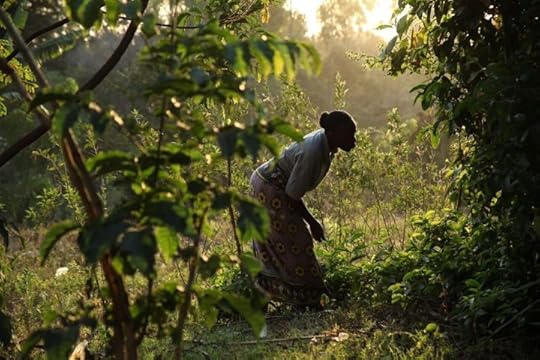
Image credit Elisabetta Demartis via Flickr CC.
This post is from a new partnership between the Kenyan website The Elephant and Africa Is a Country. We will be publishing a series of posts from their site every week. Posts are curated by Contributing Editor Wangui Kimari.
��� Thomas SankaraLook at your plates when you eat. These imported grains of rice, corn and millet���that is imperialism.
The violence that accompanied European colonization of African people was a well-known fact. But while a lot of emphasis has leaned towards the political, military and economic changes forced upon colonized people, the matter of food���the very source of survival���is seldom considered. Yet food has always been a fundamental tool in the process of colonization. Through food, social and cultural norms are conveyed, and also violated. Indeed, one cannot properly understand colonization without taking into account the issue of food and eating.
In 1895, Britain annexed the future Kenya as an East African protectorate. However, the expansion of the British Empire was met with resistance in some parts of the protectorate. The British suppressed the opposition by using different methods, from divide-and-rule tactics to military campaigns, signing treaties with local rulers and controlling food to quell dissent.
The scorched-earth policy of burning crops and killing livestock proved to be a most effective method for suppressing rebellion and colonizing the population. In his book, Kenya Diary 1902-1906, Colonel Richard Meinertzhagen describes official policy in matter of fact terms while reflecting on how during his many expeditions the burning of huts, crops, and livestock proved to be a very effective means of suppressing dissent and subduing the African native.
Feeding the monster
Once the British consolidated power in the colony, there was an influx of thousands of European settlers who were invited by the colonial government with offers of huge leases for the most fertile land in the country. The fertile expanses that later became the ���White Highlands,��� were opened for settlement through the forceful displacement of the previous inhabitants, most of whom ended up in the drier margins of their former homelands. Africans who didn���t find a place to settle became squatters on white farms or worked as laborers for Asian merchants.
The colonial state used white settlers to introduce commercial agricultural production as the mainstay of the colonial economy. The state forcibly seized land, livestock and other indigenous assets from certain communities and households on behalf of the settlers and the colonial administration, systematically marginalizing and subordinating indigenous African agriculture.
Among the Kipsigis, writes Dr Samson Omoyo in a paper titled ���The agricultural changes in the Kipsigis: A historical analysis,” describes how colonial maneuvers depleted the native stock critical for the Kipsigis��� economic and social reproduction, clearing the way for the increasing numbers of European settlers. The capital-driven process eroded the Kipsigis��� indigenous land tenure systems and gradually undermined and changed their previous way of life.
By the mid-1930s, about one-fifth of arable land in Kenya was under the exclusive control of the settlers. In addition, the state provided the settlers and corporate capital with the necessary infrastructural, agricultural, marketing and credit facilities. Above all, the state sought to create, mobilize and control the supply of African labor for capital.
The forbidden fruits
Cash crop farming quickly became the choice source of income for the settlers, who benefited from the cheap land and the large African labor force that they conscripted. British colonialists forced Africans to work on their farms and this facilitated the introduction of European food crops. Often, African workers in settler farms were paid in sacks of maize due to its high nutritional value that created a strong and healthy labor force.
When the Africans returned to the so-called ���reserves,��� they introduced maize into their subsistence farming systems, cementing its position as the colony���s primary staple crop, and replacing crops like millet, tubers, legumes and kale, which were commonly found in traditional farming systems.
In 1923, the government announced that it would promote commercial crop markets in the reserves. Little came of this because African farmers, who were more intent on providing for local food needs, showed little interest in producing for the export market.
Strong opposition to the planned introduction of cash crops led the colonial government to instead subsidize European production in order to maintain the colony���s food security. The indigenous smallholder farmers who attempted to make a living selling cash crops could not compete as a result. Eventually, in 1937, the colonial government reinstated cash crop growing in the reserves as a mainstay economic activity.
As land became scarce, Kenyans increasingly began favoring cash crops in place of subsistence farming. This made peasant household food security a tenuous affair. Commercialization resulted in the emergence of new types of households: commodity-producing households; labor-exporting households; squatter households; and working-class households. This massive displacement of people not only deprived Africans of food and ceremony, but also of traditional knowledge of food and its preparation as communities became reliant on the new economic system.
Everything from the loss of teachings about indigenous plants to cultural exchanges thorough regional indigenous markets were destroyed. As such, African farming systems were forever altered, traditional practices were lost, and cultural norms were destroyed.
But what the colonial economic system didn���t obliterate, the church did.
Things go bananas
By the 1930s, the missionary schools and other church institutions had made concerted efforts to rid local cultures of their traditions. Although earlier travelers and missionaries like David Livingstone had reported on Africans��� healthy diets, many of his predecessors held the racist and eugenicist view that food shaped the colonial body. In other words, the European body differed from that of the African people because the British diet and culinary habits differed from culinary habits of the local Africans. Bodies could be altered by diets���thus the fear that by consuming ���inferior��� African foods, Brits would eventually become like the ���natives.��� Only proper European foods would maintain the superior nature of European bodies, and only these foods and British food sensibilities could also civilize the ���African savages��� to be more like their colonizers.
In their minds, as Chloe Campbell suggests in her book Race and Empire: Eugenics in Colonial Kenya, food not only functioned to maintain the European body���s superiority, it also played a role in the formation of social identity and Britain���s ���civilizing mission��� across its empire.
The campaign to ���civilize��� the African was more successful than the missionaries could have ever hoped for. The primary vectors for the cultural indoctrination were the mission schools, churches, boarding schools and public health programs responsible for educating African youth. These methods of ���education��� uniformly reduced knowledge related to the cultivation and preparation of traditional and indigenous foods.
Traditional knowledge was devalued as the education of children was shifted from tribal elders to the imperial powers via the church and school. British education encouraged ���sophistication,” which included the rejection of traditional foods and ancient methods of food preparation, and an emphasis on British culinary sensibilities and food practices. Traditional cereals, herbs and vegetables were promptly dropped for those with high market value and perceived desirability. Thereafter, traditional foods would only be consumed in secret and infrequently mainly in the African reserves.
The pie in the sky
The symbolic nature of food was also seen in the imposition of religion, another destructive aspect of the British conquest. The Bishop of the Church Mission Society (CMS) Robert Merttins Bird, in a letter to the Christians and elders of the pastorate in Kikuyuland, forbade the consumption of local manufactured alcohol on January 1, 1930, deeming it evil and devilish, hence the need for it to be abandoned by all members of the church.
This policy, however, didn���t take into account that many cultures in Kenya had a long tradition of beer-making, the consumption of which was reserved for ceremonies and cultural events. Just as the church demonized the consumption of local alcohol, there was also a concerted effort by the colonial government to control native alcohol consumption to keep the African labor productive. Both of these policies reinforced the racist perception that Africans could not hold their liquor and disrupted production in native cereal grains used in the brews.
In 1963, when Kenya gained its independence, a new class of African elites took power. But as Franz Fanon writes in his seminal text The Wretched of the Earth, this class of (mostly) men and women did not reform the colonial state but, in fact, perfected it and exacerbated its venality towards its people. Jomo Kenyatta, the first president of Kenya, in cahoots with his cronies and senior government officials, acquired huge tracts of land and resources as they pleased. While indigenous communities suffered poverty, the confiscated resources became a source of wealth and prosperity for the political and business elite.
The effect of this massive land grab by the elite would consolidate the neocolonial system by replacing ���peasant��� modes of production with capitalist modes, and the establishment of a new African petit-bourgeois strata within sectors of the economy. Their primary occupation would be in activities of the intermediary type, scheming and hustling, and firmly entrenching their role as mediators for former colonial powers.
These elites, in cahoots with their Western allies, have passed draconian laws, illegally grabbed land, manipulated food and agricultural policies, and engaged in rampant corruption to control the food Kenyans consume. Of these, weaponizing corruption has proved to be most effective means. In the maize sector, for instance, since 1965���when the first maize scandal was reported���the politics of maize (Kenya���s staple) has been used by the political class as a system of reward and a means to pacify or punish communities for political expediency���the same tactics used by the white colonialists to suppress resistance.
A hard nut to crack
Today, there has been growing interest in the battle for control over land, food and even seeds in Kenya. Under the guise of improving food security in Kenya, a new wave of food imperialism is taking shape. A series of public-private partnerships are aggressively shaping a food policy geared towards helping corporations access prime resources and markets within Kenya���s food systems. Farmers are being forced to change from low-cost sustainable traditional agriculture to intensive, industrial farming with intensive application of chemical fertilizers, pesticides and corporate-owned seeds. This domineering framework to control what food people grow, how they grow and consume it, is in contrast to what many are calling food sovereignty.
Food sovereignty is about the right of a people to determine their own choices with regard to food and agriculture as opposed to having their food supply subjected to external forces, such as imperialism or the global economic market. Food sovereignty, therefore, according to the��US Food Sovereignty Alliance, states that people must reclaim their power in the food system by rebuilding the relationships between people and land, and between food providers and those who eat it. It must go well beyond ensuring that people have enough food to meet their physical needs.
Food has never merely been about the simple act of eating; food is history, and identity. Hence, colonialism, as a violent process, fundamentally altered the way of life of a people, including their culinary habits. Since European occupation of Africa, its people have encountered a radically altered food system. Therefore, because food choices are influenced and constrained by cultural, political and economic values, they are an important part of the deconstruction and decolonization of our social identity.
Indeed, for Africa in particular, food and food production has to go beyond just being about health, well-being, economic resilience and cultural heritage; food must be used to restore a balance of power, restore dignity and re-imagine a better future for its people. Food is power.
Written and published with the support of the Route to Food Initiative (RTFI). Views expressed in the article are not necessarily those of the RTFI.
The third brother
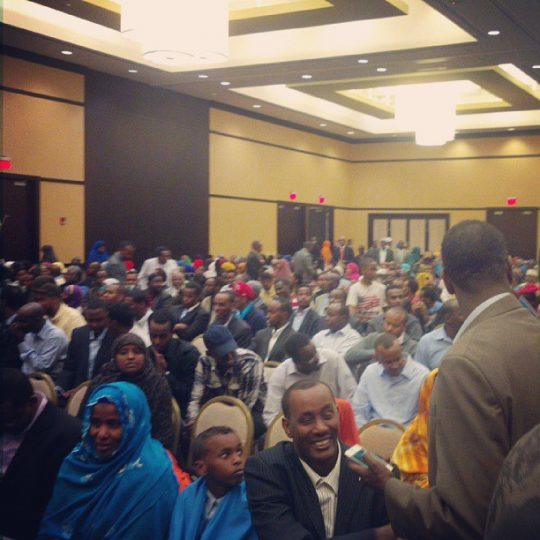
The Somali community in Columbus, Ohio, USA. Image credit Robb T. via Flickr CC.
In the United States, Columbus, Ohio is the second largest hub for Somali immigrants who fled civil war back home. It is here in contemporary Columbus where The Third Brother, the fifth novel by Andrew Welsh-Huggins, unfolds. The novel, a literary thriller, deals with private investigator Andy Hayes���s search for a Somali-American boy who has suddenly disappeared and is now suspected of joining the Islamic State or a US-based terrorist group.
The story opens with a white supremacist man and his disciple harassing a Somali immigrant woman with her young children in the street, shouting ���go home!��� Unable to stand such public assault, Hayes intuitively drops his groceries and runs to her rescue. The story is covered by local media; Hayes turns into a hero among progressives while immediately becoming a foe of the far-right. The incident also builds his reputation among the Somali community in Columbus.
Amid growing anti-immigrant and anti-Muslim sentiment on one side, and the aggressive recruitment of the Islamic State that has been chiefly targeting the second generation of immigrants across the west on the other, the Somali community in Columbus has found itself between a rock and a hard place. After Hayes���s profile rises in the media, one Somali family reaches out to him to work on a particularly haunting case: the disappearance of their beloved son, Abdi.
Abdi���s older brother, Hassan, was radicalized and joined the Islamic State in Syria where he was killed. The initial assumption of outsiders is that Abdi followed in his brother���s footsteps. This is supported by unexpected, but radical posts on Facebook claiming he will retaliate for his brother coupled with his sudden disappearance. His immediate family, the Somali community, his school and his counselor, however, are not convinced and believe Abdi is innocent. But the case has attracted some powerful players, such as the FBI. It is against this backdrop and with barely any resources that private detective Hayes embarks on his mission. The story then unfolds and branches out into seemingly tangential sub-plots. It is only towards the end of the novel as we come closer to solving the mystery that we see the bigger picture.
While reviewing the circumstances surrounding Abdi���s disappearance, the investigator uncovers layers of deeply entrenched far-right sentiments of anti-government militia on one hand, welcoming hosts who try to build diverse communities on the other and the Somali community in the middle. The Somalis have fled war and are tired of anything to do with guns; they toil to make ends meet and recover lost time. But it is in these unique circumstances of trying to build new lives in a new country that makes young people an easy target for fundamentalists, as well as for law enforcement to see them as potential suspects.
The author has created some lasting characters. Among the most memorable is the self-deprecating narrator, Hayes, who has been, ���bracketed by hefty child support payments and cash-flow ledgers that looks like a seismograph machine on a bad day in freaking country.��� His dealings with his ex-wives, and ex-girlfriends and their new partners, is fascinating to read. (What irritates him the most is his failure to be a good father to his sons, as his role has been replaced by their stepfathers.)
Welsh-Huggins is a Columbus-based Associated Press journalist who covers criminal justice, and the book has benefited from his lived experience and his journalistic style of writing. Written in terse, brisk and explosive lines, with great attention to detail, combined with graphic descriptions, the story is not solely built on suspense. For someone like myself, who is familiar with Columbus and the Somali community, the story instantly resonates. In doing so, it elevates Columbus as a fascinating city in which to set a thriller.
The Third Brother challenges the lazy oversimplifications and collective guilt by association, race, and religion that has been at the core of the current US administration���s policies on immigration. The book shows how such unchallenged and unexamined narratives can easily be manipulated by the extremists who are very much aware that the system favors them. But at the same time, the book also shows characters like the school principal, Paulus, and school counselor Barbara, who are ready to give their necks to create a safe environment and welcome vulnerable members to their existing community.
While the novel is billed as a thriller, the dense writing, literary technique and characterization, however, would put The Third Brother under the rubric of a modern classic. Particularly in portraying the everyday life of underprivileged working-class communities, the book reads as more than a thriller story and stands the test of time.
You can order the book here.
April 23, 2020
The time to act is now

Image credit Renato Gizzi via Flickr CC.
The coronavirus pandemic lays bare that which well-to-do middle classes in African cities have so far refused to confront. In the past 10 years, various media, intellectuals, politicians and international financial institutions have clung to an idea of an Africa on the move, of Africa as the new frontier of capitalist expansion; an Africa on the path to ���emerging��� with growth rates that are the envy of northern countries. Such a representation, repeated at will to the point of becoming a received truth, has been torn apart by a crisis that has not entirely revealed the extent of its destructive potential. At the same time, any prospect of an inclusive multilateralism���ostensibly kept alive by years of treaty-making���is forbidding. The global order is disintegrating before our very eyes, giving way to a vicious geopolitical tussle. The new context of economic disaster leaves countries of the global South stranded. Once again, we are reminded of their perennial status in the world order in-the-making: that of docile spectators.
The COVID-19 pandemic threatens to shatter the foundations of states and institutions whose profound failings have been ignored for too long. It is impossible to list these, suffice it to mention chronic under-investment in public health and fundamental research, limited achievements in food self-sufficiency, the mismanagement of public finances, and the prioritization of road and airport infrastructures at the expense of human well-being. All of this has in fact been the object of abundant specialized research, except that it seems to have escaped attention in spheres of governance on the continent. The management of the ongoing crisis constitutes the most glaring evidence of this gap.
On the necessity to govern with compassion
Adopting the all-securitarian model of ���containment��� of northern countries���often without much care to specific contexts���many African countries have imposed a brutal lockdown upon their populations; here and there, violation of curfew measures has been met with police violence. If such containment measures have appeased the middle classes shielded from crowded living conditions with some having the possibility to work from home, they have proved punitive and disruptive for those whose survival depends on informal activities.
Let���s be clear: we are not advocating an impossible choice between economic security vs. health security but we wish to insist on the necessity for African governments to take into account the chronic precarity that characterizes the majority of their populations. Yet, as a continent that is familiar with pandemic outbreaks, Africa has a head start in the management of a large-scale health crisis. However, it should gird itself against complacency.
Here and there, civil society organizations have shown tremendous solidarity and creativity. Despite the great dynamism of individual actors, these initiatives can in no way make up for the chronic unpreparedness and the structural deficiencies that states themselves will have to mitigate. Rather than sit idle and wait for better fortune, we must endeavor to rethink the basis of our common destiny from our own specific historical and social context and the resources we have.
Our belief is that ���emergency��� cannot, and should not, constitute a mode of governance. We must instead be seized by the real urgency, which is to reform public policy to work in favor of African populations and according to African priorities. In short, it is imperative to put forth the value of every human being regardless of status, over and beyond any logic of profit-making, domination or power capture.
Beyond the state of emergency
African leaders can and should propose to their societies a new political idea of Africa. For this is a question of survival and not a matter of rhetorical flourish. Serious reflections are needed about the functioning of state institutions, the function of a state and the place of juridical norms in the distribution and the balancing of power. This is best achieved on the basis of ideas adapted to realities across the continent. The realization of the second wave of our political independence will depend on political creativity as well as our capacity to take charge of our common destiny. Once again, various isolated efforts are already bearing fruit. They deserve to be heeded, debated and amply encouraged.
Furthermore, pan-Africanism also needs a new lease of life. It has to be reconciled with its original inspiration following decades of shortcomings. If progress on continental integration has been slow, the reason has much to do with an orientation informed by the orthodoxy of market liberalism. In consequence, the coronavirus pandemic reveals the deficit of a collective continental response, both in public health and other sectors. More than ever, we call upon leaders to ponder the necessity to adopt a concerted approach to governance sectors related to public health, fundamental research in all disciplines and to public policy. In the same vein, health has to be conceived as an essential public good, the status of health workers needs to be enhanced, and hospital infrastructure needs to be upgraded to a level that allows everybody, including leaders themselves, to receive adequate treatment in Africa. Failure to implement these reforms would be cataclysmic.
The African continent must take its destiny back into its own hands. For it is in the most trying moments that new and innovative orientations must be explored and lasting solutions adopted.
We write this to leaders of all walks of life; to the people of Africa and to all those that are committed to re-thinking the continent. We invite them to seize the opportunity of the coronavirus crisis to join efforts in re-thinking an African state in the service of the well-being of its people, to break with a model of development based on the vicious cycle of indebtedness, to break with the orthodox vision of growth for the sake of growth, and of profit for the sake of profit.
In fact, the announced external debt relief will be of limited effect as��debt is not a primary cause, but rather a symptom of a mode of development that reflects deep asymmetries within the global economy. The partial cancellation of external debt every 20 years or so is thus the manifestation of a perverse integration of African economies in the global market. It seems to us that there can be no lasting solution to the “third world debt” problem without a radical reform of the global economic system in the direction of allowing countries to become more economically and financially self-sufficient. African governments also have to be more transparent and accountable on the conditions under which they borrow external funds.
The challenge for Africa is no less than the restoration of its intellectual freedom and a capacity to create���without which no sovereignty is conceivable. It is to break with the outsourcing of our sovereign prerogatives, to reconnect with local configurations, to break with sterile imitation, to adapt science, technology and research to our context, to elaborate institutions on the basis of our specificities and our resources, to adopt an inclusive governance framework and endogenous development, and to create value in Africa in order to reduce our systemic dependence. More crucially, the restoration of African sovereignty presupposes a reconceptualization of the African citizen as a fully-fledged legal subject and the beneficiary of public policy.
It is also essential to remember that Africa has sufficient material and human resources to build a shared prosperity on an egalitarian basis and in respect of the dignity of all people. The dearth of political will and the extractive practices of external actors can no longer be used as excuses for inaction. We no longer have a choice: we need a radical change in direction. Now is the time!
This is an edited version of a letter the authors wrote and has been signed by over 90 African intellectuals, including Wole Soyinka, Cheikh Hamidou Kane, Iva Cabral, Makhily Gassama, Siba N���Zatioula Grovogui, Djibril Tamsir Niane, V��ronique Tadjo, Boubacar Boris Diop, Yolanda Bouka, among others. The original letter can be read in English or French.
Sean Jacobs's Blog
- Sean Jacobs's profile
- 4 followers



